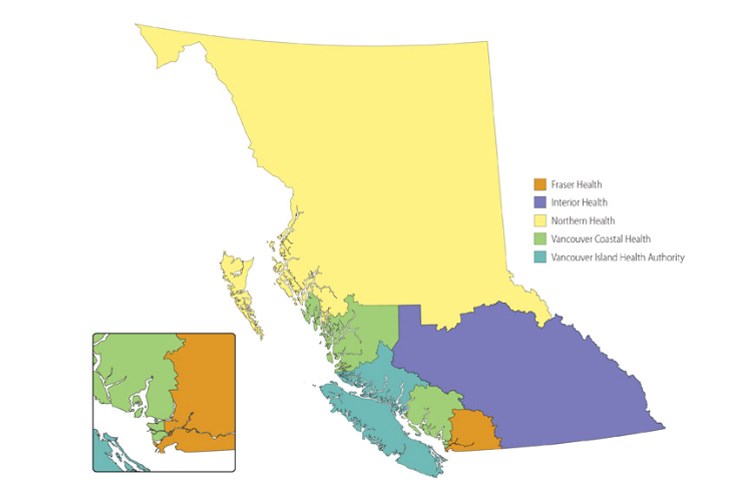Northern B.C. residents now face a $575 fine if they travel to the Lower Mainland, Fraser Valley or Vancouver Island for non-essential reasons.
On Friday Public Safety Minister Mike Farnworth issued an order using the Emergency Program Act to restrict non-essential travel between three regions in the province, based on health authority boundaries. The Northern/Interior region includes all the areas served by Northern Health and Interior Health. The other two regions are the Lower Mainland and Fraser Valley (the Fraser Health region and Vancouver Coastal Health region) and Vancouver Island (the Island Health region).
The travel ban came into effect on Friday, and remains in place until May 25 – the Tuesday following the Victoria Day weekend. The travel ban also applies to non-essential visitors from outside the province.
"The new variant strains are infecting more people and resulting in record levels of hospitalizations that place a growing strain on the front-line health workers who have been here for us throughout this pandemic. To help protect them and our communities, we must do more to discourage travel and begin to enforce restrictions on non-essential travel," Farnworth said in a press release. "While this new legal order targets those who are travelling across regional zones for recreational purposes, the advice from (provincial health officer Dr. Bonnie) Henry to stay local remains in place everywhere in B.C. Do not go to Whistler or Tofino – even on a day trip. Everyone should stay close to home."
The restriction applies to non-essential travel only (see list of essential travel reasons below). In addition, residents of some areas are prohibited to travel between regions to obtain essential goods.
Residents of Nisga'a Health Authority can travel with in the Northern-Interior region, and residents of the Bella Coola valley and central coast are allowed to travel to Port Hardy to purchase essential goods. Residents of Hope are also allowed to go to Chilliwack to purchase essential goods.
Henry urged British Columbians to comply with the spirit of the orders and stay in their own community.
"Community transmission and COVID-19 cases – including variants of concern – have increased in our health authorities, with many cases being linked to non-essential travel within B.C.," Henry said. "I am calling on everyone to stay in their local communities and support these travel restrictions to stop the most dangerous travel across regional zones to control the spread of COVID-19 and support our front-line health-care workers."
The province will be working with police departments on how to enforce the orders in the coming days, according to information released by the province.
Police will not engage in random checks, but road checks will be set up near ferry terminals and along highway corridors connecting different regions of the province. Police officers will have the discretion to hand out fines of $575 to enforce the order.
The province will also post signs on highways and at the Alberta border to warn people not to travel for non-essential purposes. BC Ferries will be restricting non-essential vehicles from boarding, and deterring non-essential bookings and limiting sailings.
All tourism and accommodation industry operators are strongly encouraged to decline bookings from outside their regional zone and cancel existing bookings. BC Parks will be doing the same at its campsites.
Tourism Minister Melanie Mark, Tourism Industry Association of B.C. CEO Walt Judas, B.C. Hotel Association president and CEO Ingrid Jarrett, Destination BC interim president and CEO Richard Porges and Indigenous Tourism B.C. chairperson Brenda Baptiste issued a joint statement on Friday urging people not to travel unless it is absolutely essential.
"While the tourism and hospitality sector has done an amazing job implementing rigorous health and safety plans to keep its staff and visitors safe, COVID-19 takes every opportunity to spread. Unnecessary travel is too risky right now. We are asking British Columbians to listen to Dr. Henry and follow all provincial health and solicitor general orders," the joint statement said. "We are at a pivotal moment in our province and we must act now to protect the health-care system. We must stay local now so we can get back to travelling across our beautiful province and once again welcome visitors."
For more information, go online to www.gov.bc.ca/covidtravel.
ESSENTIAL TRAVEL
Travel for the following reasons is exempted from the non-essential travel ban:
• Returning to your own principal residence.
• Carrying out a work-related purpose, including volunteer work.
• Moving to a different principal residence or assisting a person to move.
• Commercially transporting goods.
• Travelling to receive health-care or social services, or assisting someone to receive those services.
• Attending court or complying with a court order.
• Parents may travel to spend parenting time with a minor child, or to access child care.
• Attending classes or receiving training at a post-secondary institution or school.
• Responding to an emergency or a critical incident, including incidents that involve search and rescue operations.
• Attending a funeral.
• Travel to assist a person who requires care because of a psychological, behavioural or health condition, or a physical, cognitive or mental impairment.
• Essential visitors can travel to visit people living in long-term care and assisted living facilities.



